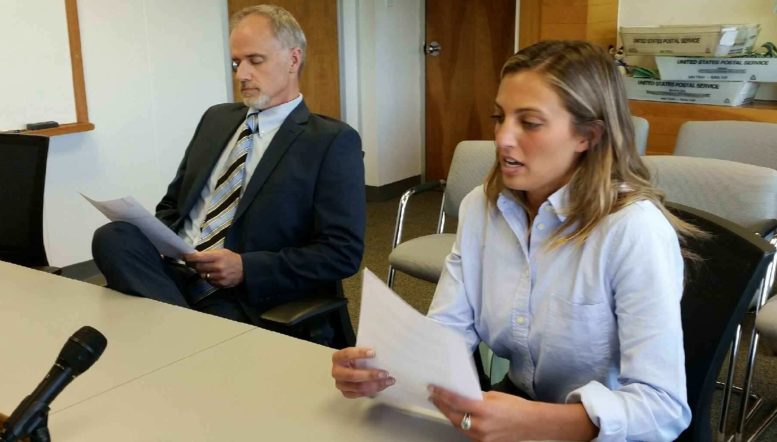By JAN LARSON McLAUGHLIN
BG Independent News
In November, Ohioans will vote on Marsy’s Law – a ballot measure intended to strengthen victims’ rights in the state.
On the surface, the law seems to offer reasonable protections to crime victims. But on Tuesday, when the Wood County Commissioners were asked to join other officials across the state supporting Marsy’s Law, they heard strong reservations about the law from Wood County Prosecuting Attorney Paul Dobson.
Marsy’s Law is named after a California woman who was stalked and killed by her ex-boyfriend in the 1980s. A week after her murder, Marsy’s family was confronted in public by her ex-boyfriend, who had been released on bail without the family being notified. Marsy’s brother has made it a mission to get the victims’ rights law passed in states.
So far, California, Illinois, South Dakota, North Dakota and Montana have adopted the law, according to Emily Hunter, who is the Northwest Ohio field director for the effort to pass Marsy’s Law in Ohio.
The law, Hunter told the Wood County Commissioners, guarantees that victims of crimes are treated as well as the defendants.
“This is making them equal to the rights of the accused,” she said. “Right now, we are seeing many victims re-victimized in the system.”
Hunter said she herself is a survivor of sexual assault. “I’ve made it my mission to fight.”
Marsy’s Law has been endorsed by several elected officials in the state, including the state attorney general, state auditor, several county prosecutors, the Buckeye State Sheriffs Association, mayors and county commissioners.
On Tuesday, Hunter asked the Wood County commissioners to add their endorsement to the law.
But Dobson, also at the table, cautioned the commissioners. He said in a “close and difficult” vote, the Ohio Prosecuting Attorneys Association decided to not support the law.
It isn’t that he doesn’t support victims’ rights, Dobson said.
“We feel that victims’ rights are very important,” he said. However, Marsy’s Law spells out the rights in the state constitution, “where they essentially can’t be changed.”
Marsy’s Law for Ohio grants the following rights:
- The right to be treated with respect, fairness and dignity throughout the criminal justice process.
- The right to information about the rights and services available to crime victims.
- The right to notification in a timely manner of major proceedings and developments in the case.
- The right to be present at court proceedings and provide input to a prosecutor before a plea deal is struck.
- The right to be heard at pleas or sentence proceedings or any process that may grant an offender’s release.
- The right to restitution.
The wording of the law is problematic, Dobson said. For example, the law guarantees the right for the victim to be present at court proceedings. That seems reasonable, unless it conflicts with the defendant’s right to a speedy trial.
If the law were to result in a conviction being overturned by a higher court, then it doesn’t serve its purpose, the county prosecutor said. “If the defendant goes free, what kind of justice is that?”
Dobson agreed that Marsy’s Law addressed “valid issues,” that he has defended throughout his career.
“You know I’ve been up here, talking about victims’ rights,” he said to the county commissioners. “My concern isn’t based on that victims are asking for too much.”
His concern is the law’s placement in the state constitution – where they cannot be tweaked beyond the current wording.
“Are we in fact doing a potential disservice,” Dobson asked. “I just don’t think the Constitution is the right place to do it.”
Wood County Commissioner Doris Herringshaw shared those concerns about the law becoming part of the state constitution.
The state already has a statute granting victims’ rights – and most prosecutors’ offices provide these protections, Dobson said. However, he said that perhaps the state statute needs some more teeth added to it “to enhance the protection and notification of the victims.”
However, Dobson said the language has already been filed for the ballot, and it will likely be passed by Ohio voters.

